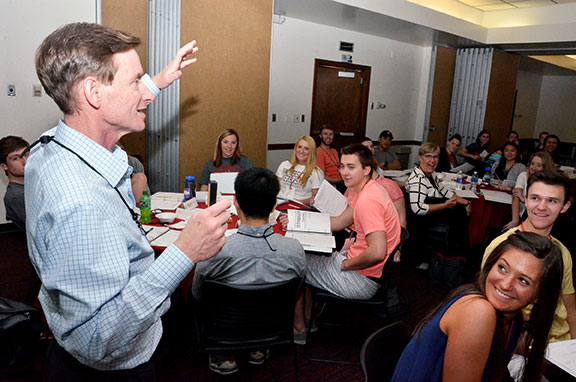
The Clifton Strengths Institute accelerated its mission of identifying and maximizing talent of college students, faculty and staff to guide their personal, professional and leadership development through the use of strengths-based sciences during the past year. The institute, funded through a $30 million donation by the Clifton Foundation and Gallup in 2015, gives the University of Nebraska–Lincoln College of Business Administration a unique ability to integrate strengths in all areas of the college.
“A lot of colleges do great strengths-based work, but to implement it as fully as we do is unprecedented,” said Mark Pogue, executive director of the Clifton Strengths Institute. “Our BSAD 111 course is required of all freshmen and its primary focus is strengths development. Rarely will you see students take their strengths assessment, and then follow up with an eight-week course intent on helping them understand how strengths have affected their past performance, and how can they apply strengths to be successful in the future. The intensity of the implementation is truly unique.”
He sees the vision for the Clifton Foundation carried out by creating a best practice environment to impact students, faculty and staff. This fall, the institute added 80 student strengths coaches to assist teaching core concepts of strengths-based science.
“I haven’t seen a program that has provided this much intention of giving one-on-one strengths coaching. We took a big step this year by giving all our 760 freshmen a relationship with a trained coach, who is also a student peer a year or two ahead of them. We trained these coaches to build a performance plan around each student.”
Holly Pham, a junior international business major from Lincoln, jumped at the chance to be a strengths coach. She wanted to be of service to her younger classmates.
“The day I decided to be a strengths coach was the day I knew I was going to make a difference in someone’s life,” said Pham. “Nothing is more satisfying and empowering than helping a freshman see their potential. At a big campus like Nebraska, it’s easy to feel alone. Working one-on-one with students closes that gap. After a coaching session, I can immediately tell they feel more confident with themselves in utilizing their strengths to succeed.”
Pogue came to CBA from Gallup where he founded its Higher Education Division, applying management sciences of strengths, engagement and leadership to a variety of university settings. He believes it is significant to reach students as they transition to college life.
“The first week of class we show students the scientific information about why it’s important to develop their strengths and how that plays out in the workplace. People who apply their strengths are faster, more accurate and more emotionally engaged in the work they do. They stay at their jobs longer because they like what they’re doing,” he said.
The institute also began the new Clifton Builders Program this year. The program identifies and develops students who want to change the world by creating new businesses, building teams or building communities through leadership and involvement. It consists of 12 credit hours including nine hours of specific Builder’s Program courses. An experiential component pushes students to get involved with small businesses or participate in various entrepreneurial activities and organizations on campus.
More details at: http://cba.unl.edu/strengths